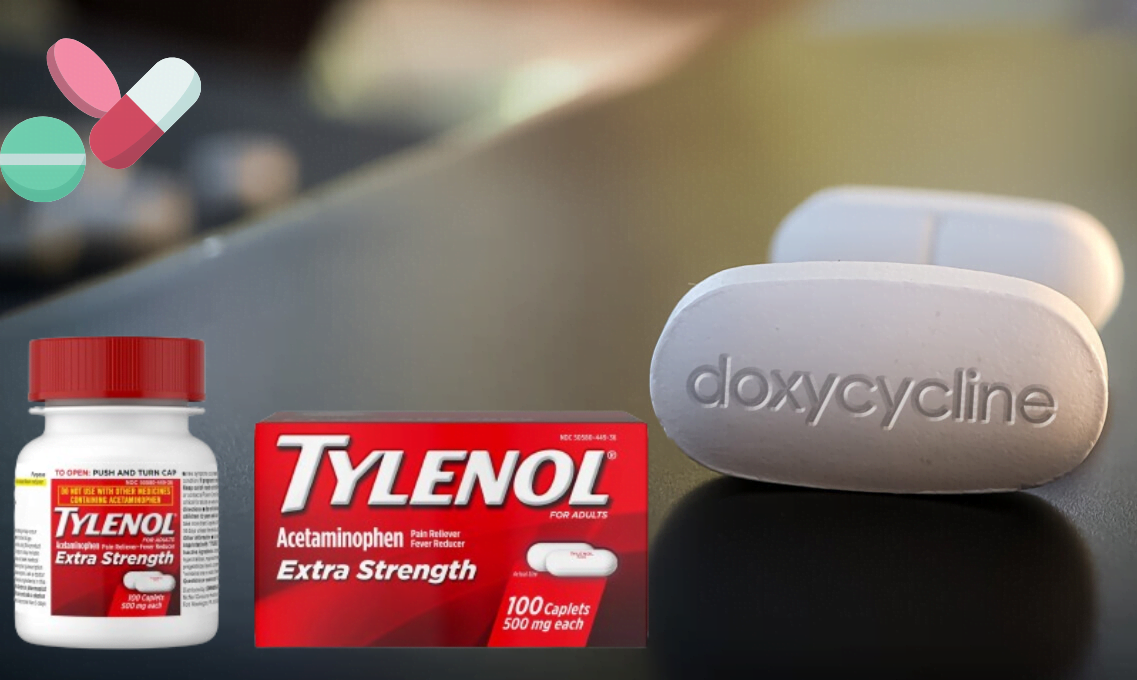Can You Take Tylenol with Doxycycline? A Comprehensive Guide

When prescribed antibiotics like doxycycline, it’s common to wonder about potential interactions with over-the-counter medications, such as Tylenol (acetaminophen). Understanding how these medications interact is essential for your safety and health. If you are looking for Tylenol to help manage pain while on antibiotics, you can find it here.
This article will provide a detailed look into whether you can take Tylenol with doxycycline, including its uses, potential interactions, side effects, and general guidelines for safe usage.
What is Doxycycline?
Doxycycline is a tetracycline antibiotic well-known for its ability to inhibit bacterial growth and has some anti-inflammatory effects. It’s often used to treat a variety of bacterial infections, such as acne, rosacea, urinary and respiratory tract infections, eye infections, and gum disease. For more serious conditions, doxycycline can treat sexually transmitted infections like gonorrhea, chlamydia, and syphilis.
One of the unique things about doxycycline is its versatility. It’s effective against bacteria and can also prevent malaria and treat infections caused by mites, ticks, and lice. This medication has two primary salt forms: doxycycline hyclate and doxycycline monohydrate.
The hyclate form is more soluble in water, while the monohydrate is only slightly soluble. You can find doxycycline in different strengths, such as 100mg, 75mg, and 50mg, and in various forms, including capsules, tablets, injections, suspensions, and syrups.
In some cases, doxycycline is also used in dental care to improve tooth attachment and reduce gum pockets after a dental procedure called scaling and root planing, particularly for those with gum disease like periodontitis.
It works by targeting certain bacteria that cause these conditions. As someone who has seen the benefits of doxycycline firsthand, I know this antibiotic is quite effective across various treatments. However, like any medication, following your doctor’s advice is important to ensure it’s used correctly.
Potential Side Effects of Doxycycline
When using doxycycline, it’s important to be aware of potential side effects. While this medicine is generally well-tolerated, some unwanted effects may occur. If you experience any unexpected effects, you must check with your doctor. More serious issues might arise that require immediate medical attention in rare cases. Always monitor your condition and consult your healthcare provider if you notice any significant or concerning symptoms.
Also Read: Doxycycline Ruined My Life: Understanding the Impact and Seeking Solutions
Common Side Effects of Doxycycline:
- Nausea or vomiting
- Diarrhea
- Loss of appetite
- Sensitivity to sunlight (photosensitivity)
- Rash or itching
Serious Side Effects of Doxycycline:
- Severe headaches or vision problems (could indicate intracranial hypertension)
- Persistent sore throat or fever (could indicate a new infection)
- Severe stomach or abdominal pain
- Yellowing of the eyes or skin (jaundice, indicating liver issues)
- Difficulty swallowing or heartburn
What is Tylenol (Acetaminophen)?
Tylenol is a popular pain reliever and fever reducer. It’s often used to reduce fever and relieve minor pain from colds, flu, headaches, muscle aches, arthritis, and menstrual cramps. Available in various forms, including pills, chewable tablets, liquid, suppositories, and intravenous (IV), Tylenol can be given to infants and children. However, it should be avoided if there are liver abnormalities or if you’re taking other medications that affect liver function. Tylenol is generally used for pain relief and managing fevers, and it can be used up until surgery if scheduled.
Potential Side Effects of Tylenol
Tylenol is generally safe, but like any medication, it can have side effects. Some people may experience unusual effects, such as a severe allergic reaction, though this is rare. Symptoms might include rash, itching, swelling of the face, tongue, or throat, severe dizziness, and trouble breathing. If you notice any of these symptoms or other effects not listed above, it’s essential to contact your doctor or pharmacist for medical help. Always weigh the benefits versus the risks when using Tylenol and monitor for adverse reactions.
Common Side Effects of Tylenol:
- Nausea
- Rash
- Headache
- Insomnia (difficulty sleeping)
Serious Side Effects of Tylenol:
- Liver damage (especially at high doses)
- Severe skin reactions
- Allergic reactions such as swelling, dizziness, or trouble breathing
Can You Take Tylenol with Doxycycline?
Yes, you can generally take Tylenol (acetaminophen) with doxycycline. There are no direct interactions between these two medications, meaning they do not typically affect each other’s efficacy or safety when taken together. Tylenol and doxycycline work differently in the body. Tylenol is processed in the liver to alleviate pain and reduce fever. In contrast, doxycycline fights bacterial infections by targeting protein synthesis in bacteria.
However, while there are no known direct drug interactions, it’s essential to consider a few factors before taking these medications together:
- Underlying Health Conditions: If you have pre-existing liver conditions, consult your healthcare provider before taking Tylenol, as acetaminophen can affect liver function, especially at higher doses.
- Medication Dosage: Adhere to the recommended dosages for both Tylenol and doxycycline. Overdosing on either medication can lead to severe side effects. For Tylenol, the maximum daily dose for an adult is typically 3,000 to 4,000 mg, but it is best to stay within the lower range to avoid potential liver damage.
- Duration of Use: If you plan to use Tylenol for an extended period while on doxycycline, it is advisable to consult with a healthcare professional. Prolonged use of acetaminophen can increase the risk of liver toxicity, especially if other risk factors are present.
Important Considerations for Combining Medications
- Consult Your Healthcare Provider: Always check with your healthcare provider or pharmacist before combining any medications, including Tylenol and doxycycline, especially if you are taking other medications or have pre-existing health conditions.
- Stay Hydrated: Doxycycline can cause esophageal irritation or ulcers, so it’s important to take it with a full glass of water and avoid lying down immediately after taking the medication.
- Avoid Excessive Sun Exposure: Since doxycycline can cause photosensitivity, use sunscreen and protective clothing outdoors to prevent sunburns.
- Monitor for Liver Health: If you need to take Tylenol for an extended period or at higher doses, monitor for symptoms of liver damage, such as yellowing of the skin.
- Follow Dosage Instructions: Ensure you follow the dosing instructions provided by your healthcare provider or the medication packaging to avoid any risk of toxicity or adverse reactions.
Also Read: How Long Does Doxycycline Antibiotics Stay in Your System
What to Do if You Experience Side Effects
If you experience mild side effects, such as nausea or a mild rash, they might not require immediate medical attention. However, if you experience severe side effects or symptoms of an allergic reaction (such as difficulty breathing or swelling of the face, lips, tongue, or throat), seek emergency medical attention.
If you suspect liver damage (signs include yellowing of the skin or eyes, severe stomach pain, dark urine, or extreme fatigue), discontinue Tylenol and consult your healthcare provider immediately.
Conclusion
In summary, it is generally safe to take Tylenol (acetaminophen) with doxycycline, as there are no direct interactions between these two medications. However, always consult with your healthcare provider before combining any medications, especially if you have pre-existing conditions or are taking other prescriptions.
Monitoring your body’s response to these medications, following proper dosage guidelines, and avoiding excessive sun exposure while on doxycycline are essential to ensure your safety and well-being.
FAQ:
Can I take Tylenol with doxycycline if I have liver problems?
Consult your healthcare provider before using Tylenol if you have liver issues, as acetaminophen can exacerbate liver problems.
How often can I take Tylenol while on doxycycline?
Follow the dosing instructions on the Tylenol label or as prescribed by your healthcare provider.
Are there any foods or drinks I should avoid while taking doxycycline?
Avoid dairy products and antacids close to the time you take doxycycline, as they can interfere with absorption.
What should I do if I experience side effects from taking Tylenol or doxycycline?
Contact your healthcare provider immediately if you experience severe or unusual side effects.
Can I use other pain relievers while on doxycycline?
Other pain relievers like NSAIDs can be used, but consult your healthcare provider to avoid potential interactions.





